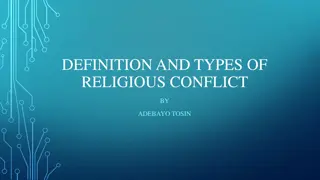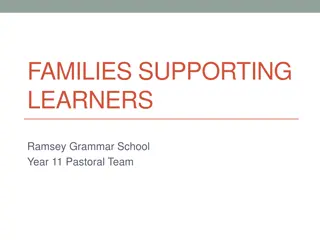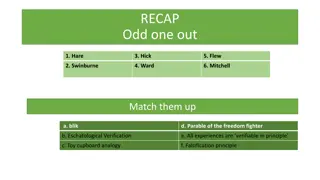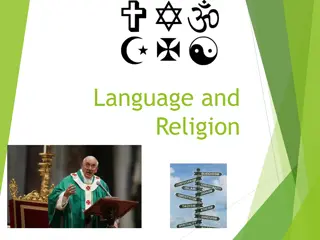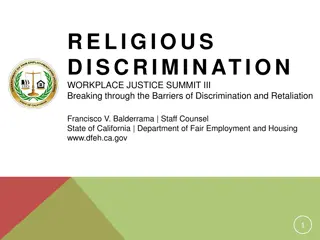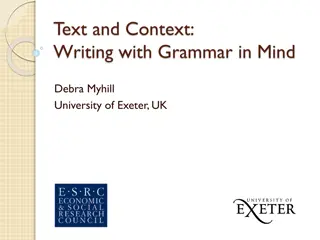Overview of Religious Studies Course at Ramsey Grammar School
The Religious Studies course at Ramsey Grammar School for Year 9 students covers topics such as Christianity, Islam, Life and Death, Good and Evil, beliefs, practices, and church diversity. Students will be assessed through a written examination at the end of Year 11, with no coursework requirement. The course delves into various aspects of different religions, ethical decision-making, teachings of Jesus, and the diversity of Christian churches. It aims to provide a comprehensive understanding of different religious beliefs and practices.
Download Presentation

Please find below an Image/Link to download the presentation.
The content on the website is provided AS IS for your information and personal use only. It may not be sold, licensed, or shared on other websites without obtaining consent from the author.If you encounter any issues during the download, it is possible that the publisher has removed the file from their server.
You are allowed to download the files provided on this website for personal or commercial use, subject to the condition that they are used lawfully. All files are the property of their respective owners.
The content on the website is provided AS IS for your information and personal use only. It may not be sold, licensed, or shared on other websites without obtaining consent from the author.
E N D
Presentation Transcript
Ramsey Grammar School Year 9 Options 22ndApril 2021
Religious, Moral & Philosophical Studies WJEC Short Course: C00/1167/4 This is a COMPULSORY subject NB The exam is called Religious Studies though the Department is known as RMPS.
How is the course assessed Students will take one written examination at the end of Year 11 which will be two hours long. There is no coursework requirement for this course. Throughout the two years they will be assessed in class on past examination style questions.
What is covered in the course Part A Christianity Part A Islam Part B Life and Death Part B Good and Evil Further details can be found in the Options brochure.
What is covered in the course Part A Christianity BELIEFS God omnibenevolence, omniscience, omnipresence Creation from the Genesis accounts of Humanity: image of God, soul, moral, free will, rational, creative, fallen, aspects of one God - Father, Son Holy Spirit Creator and sustainer, omnipotence, Beliefs and teachings on Nature Trinity: The three
What is covered in the course Jesus as God Incarnate Son, Holy Spirit Word: the Incarnation, salvation and atonement His birth, crucifixion, resurrection (key elements of the accounts of Jesus' birth, death, resurrection and ascension Jesus as Messiah, Saviour,
What is covered in the course PRACTICES Morality Divine command/absolutist and situational/relativist approaches to ethical decision making Teachings of Jesus agap Forgiveness Heaven Love / Treasures on earth / in
What is covered in the course Church Diversity of Christianity: Catholic, Anglican, Church in Wales, non-conformist churches and chapels local church Diverse features of churches and chapels and diversity of worship practices. communal and private Social and community functions of churches, examples in Wales: food banks, the work of the Salvation Army, the work of Shelter Cymru working for Social justice, Reconciliation, Inter-faith dialogue e.g. Interfaith Council for Wales, World Council of Churches, Christian-Muslim Forum, Council of Christians and Jews Persecution of Christians in the modern world Role of the Importance of prayer, Christian groups
What is covered in the course Part A Islam BELIEFS The Nature of God Allah as one God: Tawhid Qur'an; e.g. immanence, transcendence, omnipotence, beneficence, merciful, the 99 names of Allah meaning of Islam as 'submission' to Allah and how Muslims live a life in submission to the will of Allah, including the importance of Greater Jihad of faith in Allah, shirk as sin against Allah prohibition of images of Allah or any human figure The qualities of Allah in the The Shahadah as a statement Reasons for the
What is covered in the course The Qur'an Qur'an as a sacred text and guide for daily life Revelation of the Qur'an by Allah, through Angel Jabril to the prophet Muhammad importance of the Hadith and Sunnah for Muslims Examples of respect for the Qur'an as the direct word of Allah The
What is covered in the course Practices The Five Pillars of Sunni Islam Prayer/ Salat Adhan call to prayer, praying at mosque and Friday Jummah prayer prayer (Du'ah) The preparations and intention for prayer: wudu and niyyah and symbolism of the different prayer positions that make a rakat (sequence of prayer) Praying at home, private The significance
What is covered in the course Obligatory Acts Shahadah: the Muslim profession of faith in Allah and the prophet Muhammad; occasions when the Shahadah is recited, e.g. aqiqah ceremony, conversion to Islam an alms (or charity) tax to benefit others, what zakat tax may be used for, and additional charity (saddaqah) Sawm: Fasting during the month of Ramadan. How and why Muslims fast during Ramadan and rules about halal and haram diet Zakat: paying
What is covered in the course Part B Life and Death The World Diverse Christian beliefs, teachings and attitudes about the accounts of the origin of the universe The relationship between Christian views and non-religious views of creation and the extent to which they conflict Christian beliefs, teachings and attitudes about dominion, stewardship, environmental responsibility, sustainability, and global citizenship The work of Christian Aid to promote global citizenship Non-religious views on: universe: 'Big-Bang theory' (Stephen Hawking) 'Blind' Evolution versus 'Planned' Evolution (Charles Darwin and Richard Dawkins) stewardship, social and community responsibility, sustainability; 'Humanists for a Better World' the creation of the
What is covered in the course Part B Life and Death The Origin and Value of Human Life Diverse Christian beliefs, teachings and attitudes toward the origin and sanctity of human life Diverse Christian attitudes towards abortion and euthanasia, including Catholic and Church in Wales' views on beginning and end of life issues organ donation and Christian responses to it Welsh laws regarding: Non-religious views on: relation to abortion and euthanasia (the views of Peter Singer - 'speciesism') 'Right to Choose', 'Dignity in Dying' (euthanasia) emphasis on life before death rather than after-life situationist/relativist approach rather than doctrinal or absolutist quality of life over sanctity of life in
What is covered in the course Part B Life and Death Beliefs about Death and the Afterlife Christian beliefs and teachings about life after death, including soul, judgement, heaven and hell Diverse Christian beliefs about the after-life: Heaven, Hell, Resurrection, Purgatory Christian funerals reflect beliefs about the after- life Humanist funerals in Wales as reflections of beliefs about death as the end of life How
What is covered in the course Part B Good and Evil Crime and Punishment What makes an act 'wrong'? ethical responses: relative and absolute morality, conscience, virtues, sin about the causes of crime and the aims of punishment: justice, retribution, deterrence and reformation The treatment of criminals and the work of prison reformers and prison chaplains Varied Christian responses to the Death Penalty, including interpretations of Christian teaching Religious and Beliefs and attitudes
What is covered in the course Part B Good and Evil Forgiveness Peace and conflict: Just War Theory, Pacifism and Conscientious Objectors, Wales' Society of Friends (pacifism) Christian teachings about forgiveness, including interpretations of teachings Examples of forgiveness arising from personal beliefs
What is covered in the course Part B Good and Evil Good, Evil and Suffering Philosophical perspectives on the origin of evil: Original Sin (free will) and 'soul-making' (Augustine and Irenaeus/Hick) Philosophical challenges posed by belief in God and the existence of evil and suffering
Qualities needed for success, Skills developed Students who can reflect on key issues and present a balanced argument with reference to religious teachings do well. The course will : develop understanding of religions and non-religious beliefs develop understanding of religious beliefs, teachings, practices, and sources of wisdom and authority. develop ability to construct well-argued, well-informed, balanced and structured written arguments Provide opportunities for students to engage with questions of belief, value, meaning, purpose, truth, and their influence on human life Challenge learners to reflect on and develop their own values, beliefs and attitudes in the light of what they have learnt and contribute to their preparation for adult life in a pluralistic society and global community.
Expectations Students should be able to work independently, in pairs and as part of a small group Homework will be set to support in-class learning. If homework is not set, keep up to date with current affairs Students should keep a complete and well presented set of class notes to help with their revision Any missed work due to absence should be caught up and kept up to date
Texts and additional resources The set text book will be available for use in lessons An optional revision guide is available for purchase to help with revision ISBN 978-1-5104-2343-5 An open mind and a willingness to join in group discussion and a pen!
How can home support There are many ways parents can help students to succeed in RMPS GCSE . Take an interest in the topics being studied and discuss your own point of view. Watch news and current affairs programmes together and talk about them. Engage in regular debate with your child in order to develop skills in analysis and evaluation.
Where to go for more advice WJEC website https://www.wjec.co.uk/qualifications/religi ous-studies-gcse/#tab_overview Student voice Ask older friends or siblings about their time on the course Ask Mr. Lillie or Miss Boyle for more info





